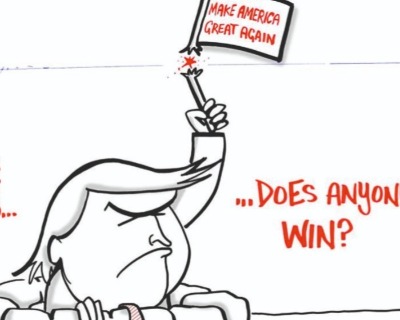Risky business: US exports populism, Canada and Mexico weaponize
The US’s most successful export at the moment seems to be populism, says Rebecca Harding, CEO of Coriolis Technologies. TXF and Coriolis Technologies’ country risk index investigates the trends in trade weaponization in the Americas. Here, Canada and Mexico export arms, Central America imports populism. This is the third in the series of seven insights.

TXF: In this segment, risky business we're looking at the Americas as a part of the country risk index. It's a broad topic, shall we start with the big one?
Rebecca Harding (RH): I presume by the big one you mean the US and the risks in the US have fairly understandably increased over the last six months and there is no sign of them abating.
Where are these risks? Well we've seen an increase in trade in our arms and weaponization index. Dual-use goods and arms trade have increased. Some of that has to do with strategy, some of it is to do with the fact that the Make America Great strategy has a military component to it as well.
Interestingly though it's not exports. It's imports. It's not necessarily contributing to the big explicit problem which is a budget deficit and the trade deficit. Now a lot of the tension between America and other countries in the region has dominated news around the world. We're looking at US-China we're looking at US-Russia we're looking at US-Iran.
I was in a conference the other day where somebody said '[President] Trump doesn't seem to be bothered about Europe anymore'. Well he's not bothered about Europe at the moment because his meeting with Europe on trade stuff is at the end of November. The midterms are out of the way. We saw an increase in the rhetoric in the US around the midterms to try and secure the Republican position. As we move towards the next presidential election we will project that this type of rhetorical weaponization will only increase. [Trump] has meetings with the G20 in a couple of weeks' time.
And that will demonstrate whether or not this US China trade conflict is going to come to a head or whether actually they'll come to some kind of solution. The runes aren't looking that good at the moment. So The US is exporting brilliantly its populism around the world. So if it's become an exporter of anything it is this populism which has been bubbling under the surface everywhere for a long time.
Populism in and of itself isn't new. We're seeing it in Europe. We're seeing it across Asia but we're seeing it particularly strongly in America and Central America and South America. Argentina has a strand of populist politics. Brazil has obviously elected a populist leader now that's going to create tensions. And I think the biggest change that we've seen and the biggest red flag that we're seeing at the moment is in Central American countries because the rhetorical threat that we're seeing in the news from populism but also foreign policy concerns particularly in relation to the US that has increased almost exponentially over the last six months. We can't see that abating and you're seeing these caravans on the Mexico borders. That's all part and parcel of the same thing.
TXF: Moving to the to the northern neighbour, are we seeing any weaponization in Canada. How is that relationship?
RH: We've seen the renegotiation of NAFTA. We've seen that go quiet for a little while. Canada itself is weaponizing and actually in terms of its exports rather than its imports. And a lot of that is going to Ukraine. So in a sense the US has an interest in Ukraine outside of more general NATO politics. Canada is actually servicing some of the arms needs of that area and that's almost a proxy conflict. Canada is supplying weapons and has been exporting quite significant amounts to Ukraine as part of its NATO engagement. So that's one that's on watch at the moment.
TXF: To the immediate south [of the US] to Mexico itself. NAFTA's being renegotiated, 'build a wall', it seems to be a little bit quieter?
RH: On a populist front Mexico's quieter. What's interesting is that Mexico is itself becoming more weaponized. We've seen both imports and exports increase. Mexico's exporting to Central America which has to be a concern, arms, and it's importing more as well.
But conflict in Mexico, within Mexico. So one of the indices that we have is corruption and domestic conflict. The war on drugs is a war on drugs. The military are involved with that. That is a real concern and that's one of the reasons why we see this more weaponized trade profile of a country like Mexico because it is actually fighting literally a war on drugs cartels within the country. And that obviously then has an influence over its relations with the rest of South America because Mexico's geographically in the north. But Latin America aligns with Latin America and that's a big concern.
TXF: Argentina's hosting the G20. Is there going to be more focus on Argentina in the next few weeks?
RH: Argentina has a lot of good things that are happening but it also has this very strong populism. And there will be a focus on Argentina. But I think they'll have their thunder stolen by the US-China trade conflict.
TXF: And in Brazil, populism?
RH: Populism has been there and it's been evident in in Brazilian politics for years. The problem with Brazilian politics is it's shifted to the right. The other thing about Brazil is that it's actually becoming a proxy for the trade war between China and the US.
TXF: Because of soybeans?
RH: Exactly. Actually what is beginning to happen is you're seeing soybean supply chains shift. Now that makes Brazil very dependent on the US. Because Brazil can't plant enough soybeans at the moment to feed China. But China is moving towards Brazil and other countries as US tariffs start to bite. It's a difficult situation for Brazil. Levels of corruption are very high and if it has trade dependencies, for example on taking some US produce and then shipping it on, forwarding it to China, that creates dependencies almost on the dispute. And as soon as that gets resolved, if it gets resolved, then Brazil's trade situation changes. And that's a risk.





